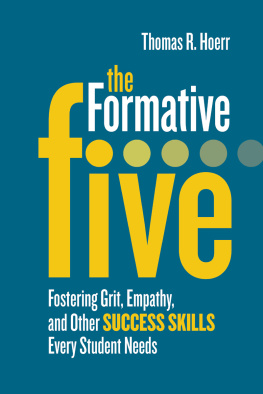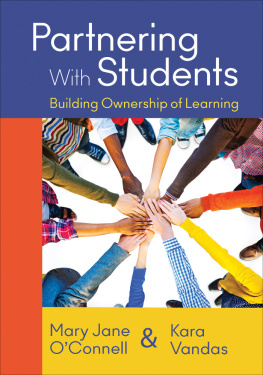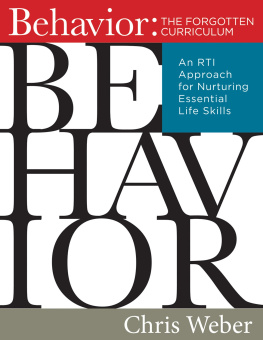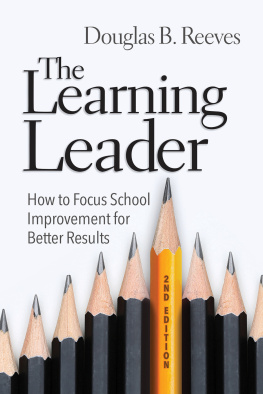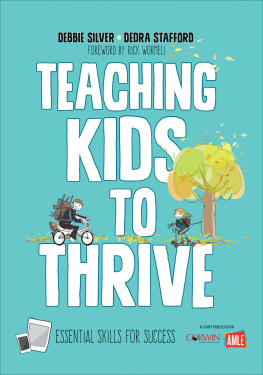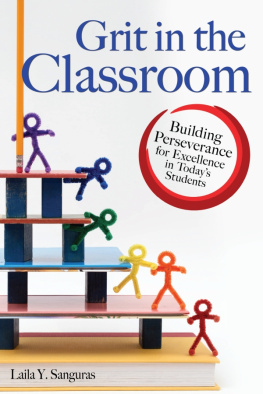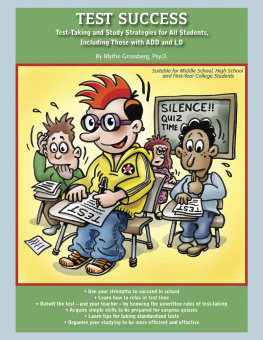Introduction
....................
Character is higher than intellect.
Ralph Waldo Emerson
About a decade ago, I attended a conference for principals that changed how I think about the purpose of schools and the focus of my work. One of the speakers, James Honan of the Harvard Graduate School of Education, asked us to consider the following question: "How do you know when your school is successful?" We thought silently to ourselves for a moment before engaging in animated discussions at our tables. After a few minutes, we shared our responses with Honan, who wrote them down on a paper attached to a large easel.
Unsurprisingly, answers included high test scores, strong graduation rates, good student attendance, and graduates being accepted at schools of their choice. Someone shouted out "winning sports teams," to which a wise person replied, "How about winning sports teams where everyone plays?" eliciting lots of smiles and affirming nods. Another person suggested that a good mark of success would be going a week without the toilets getting clogged and with no school bus delays. Again there were many smiles and nods. Others mentioned going a week with no discipline problems; still others, going a week with productively involved parents. A couple of folks, myself included, mentioned the value of students being engaged in learning. When we were all done sharing, Honan spoke.
"You're all missing the boat," he said.
The room was silent.
"These achievements are important," he continued, "but you should be asking yourselves whether your students are going to be productive and happy citizens at age 25, 45, and 65. What kinds of adults will they be? Will they be good spouses, good friends, and good parents? Will they be respectful and honest, and will they work to make the world a better place? Those are the qualities that we should be valuing and pursuing in our schools. And those are the measures of your school's effectiveness."
Our Challenges
Of course, Honan was right. We must teach students to read, write, and calculate, but that's only the beginning; those goals should form the floor, not the ceiling, of their education. Our timeline is too short and our aspirations are too low if we limit our curriculum and pedagogical focus to tests, grades, and diplomas. We must step back and look at what's needed to achieve success in the real world, not just in school.
Although it has not been a significant part of the dialogue among educators, the distinction between what is needed to succeed in school versus out of it is one that writers and leaders have talked about for some time. Among the implications of Tom Friedman's "flattened world" (2005), for example, is that our workers increasingly compete against people who live thousands of miles away in other countries, rendering traditional scholastic skills important but insufficient. As Friedman put it more recently, "Thanks to the merger of, and advances in, globalization and the information technology revolution, every boss now has cheaper, easier access to more above-average software, automation, robotics, cheap labor and cheap genius than ever before" (2012). We need to prepare our students to be adaptable and flexible to meet a future in which the only constant will be change.
Friedman is not alone in expressing concern; there is a growing awareness that our graduates will need much more than mastery of the three Rs to make it in the world. As Kay and Greenhill (2012) note, "Doing well in school no longer guarantees a lifelong job or career as it did for previous generations of Americans only people who have the knowledge and skills to negotiate constant changes and reinvent themselves for new situations will succeed" (p. xvii). Paul Tough, referring to those who question the "cognitive hypothesis" of academic accomplishment being the singular key to success, says, "What matters most in a child's development, they say, is not how much information we can stuff into her brain in the first few years. What matters, instead, is whether we are able to help her develop a very different set of qualities, a list that includes persistence, self-control, curiosity, conscientiousness, grit, and self-confidence" (2012, p. xv).
Henry Cloud makes a similar point in his 2006 book Integrity. After describing the traditional skills that are commonly associated with leadership, he cites the greater importance of factors that are not generally considered part of schools' curriculum or measured on scholastic tests. The qualities that determine good leaders, says Cloud,
have little to do with IQ, talent, brains, education, training, or most of the other important components of success. Instead, they have to do with the other aspects of character functioning that we pay way too little attention to in training people to be leaders and to be successful. The most important tool is the person and his or her makeup, and yet it seems to get the least amount of attention and work. Mostly, we focus on professional skills and knowledge instead. (p. 10)
Similarly, Jensen (2012) cites research by the Carnegie Institute of Technology showing "that 85 percent of your financial success is due to skills in human engineering, your personality and ability to communicate, negotiate, and lead. Shockingly, only 15 percent is due to technical knowledge."
As difficult as it is to transition from the cognitive hypothesis to a focus on success in life after graduation, we really have no choice: continuing to teach the same content does a disservice to our students. We cannot be deterred by fear from venturing into the nonscholastic realm. To quote Lisa Firestone (2016):
Too often, we tend to think of our kids as less sophisticated and incapable of processing or understanding the emotional complexities of their world. We think we're protecting them by not bringing up the trickier, less pleasant subjects. But I can tell you firsthand that kids absorb a tremendous amount. Pretty much as soon as they're verbal, children can be taught to identify and communicate their feelings. In a trusted environment where emotions are talked about openly, most kids will speak freely about their feelings and are quick to have empathy for their peers.
In Social Emotional Learning: Opportunities for Massachusetts and Lessons for the Nation (2016), Rennie Center and ASCD note that success "in our increasingly dynamic global society requires students to develop skills that extend far beyond mastery of academic content" (p. 1). They continue:
Various terms have been used to refer to these abilities, such as noncognitive skills, soft skills, or 21st century skills. More important, however, is the growing acknowledgment that students' social and emotional learning (SEL)or the processes through which students and adults acquire and effectively apply the knowledge, attitudes, and skills necessary to understand and manage emotions, set and achieve positive goals, feel and show empathy for others, establish and maintain positive relationships, and make responsible decisions is critical to developing competencies besides academic content knowledge that are necessary to succeed in college and in careers. (p. 1)
Perhaps the need for this book is captured best by Smith, McGovern, Larson, Hillaker, and Peck (2016):
Not long ago, success in school meant success in life. We also believed that things like grit and determination were traits people were born with, not skills that could be developed over time. Over the past few decades, hard and soft sciences have produced an impressive body of evidence that teaches us two very new, very important things. First, that we can take our innate abilities and cultivate them, just like we build up muscle, dexterity, and language fluency. And secondly, that social and emotional skills matter just as much in determining life satisfaction and success as traditional intelligence. The use of the word "skills" here is intentional. These qualities are not only innate. They can be taught. And, they can be learned. (p. v)

